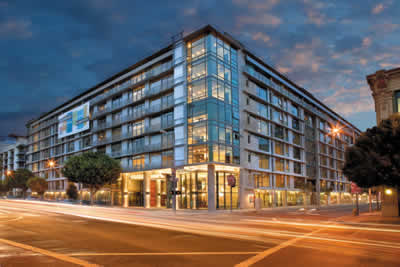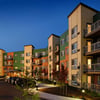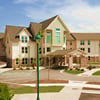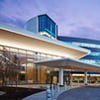
Federal Housing Administration - FHA Apartment Loans
FHA is a federally guaranteed program under the government’s Department of Housing and Urban Development (HUD). FHA Loans can be used for the purchase/refinance as well as the construction/ substantial rehabilitation of multifamily or healthcare properties. Loans are non-recourse (except standard carve-outs) and rates are very competitive with 35-40 year fixed terms and amortizations. FHA are available nationwide and are available for any market (primary, secondary, tertiary). Because of the longer diligence/underwriting period and closing time of FHA mortgages, we can arrange for a well-priced, short-term bridge loan with minimal fees until closing if necessary. There are 2 major FHA programs under which the rest of the products fall:
| Loan Type | Property Type * | Min Loan Amount | Max LTV | Term Length | Amortization | Rates |
| FHA / HUD | A, AH, C, H, MC, SH, SNF | $5,000,000 | 83.3% | 30-40 Years | 30-40 Years | |
| *A = Apartment AH = Affordable Housing C = Cooperative H = Hospitals MC= Memory Care SH = Senior Housing SNF= Skilled Nursing Facilities | ||||||
| Additional Information: | Multifamily Programs | Healthcare | Underwriting Parameters | Loan Features | ||||||
Multifamily Programs:
FHA’s multifamily program is for the purchase/refinance or construction/rehabilitation of traditional, affordable, senior, cooperative or manufactured housing communities. Properties must be in good condition (for purchase/refinance) and not more than 30-40 years old unless substantially rehabilitated. Borrowers must have previous FHA ownership/management experience if they are managing the property themselves or hire an FHA property manager unless an FHA waiver is attained.
Healthcare Programs:
The Office of Healthcare Programs (OHP) oversees Section 232 for Residential Care Facilities and Section 242 for Hospitals programs. Both insurance products enable the affordable financing and refinancing of healthcare facility projects nationwide. These programs reduce the cost of capital needed by hospitals and residential care facilities and improve access to quality healthcare while decreasing overall healthcare costs.
The Office of Hospital Facilities (OHF) manages the Section 242 program, which provides mortgage insurance for acute care hospital facilities ranging from large teaching institutions to small rural critical access hospitals. The Office of Residential Care Facilities (ORCF) manages the Section 232 program, which provides mortgage insurance for residential care facilities such as assisted living facilities, nursing homes, intermediate care facilities, and board and care homes.
Multifamily Programs
Rental Housing - Section 207: Section 207 is no longer used for new construction and substantial rehabilitation; developers and lenders prefer Section 221(d)(4), which has more favorable terms. It is, however, the primary product for the Section 223(f) refinancing program. In fiscal year 2013, the Department did not insure any mortgages under this section.
Manufactured Housing - Section 207: Section 207 insures mortgages to provide financing for mobile home parks.
Cooperative Housing - Section 213: Section 213 facilitates the construction, substantial rehabilitation, and purchase of cooperative housing projects. Each owner shares the whole project with the exclusive right to occupy a specific unit and participate in operations through stock purchases. In fiscal year 2013, FHA insured 2 projects with 114 units, totaling $16.7 million and averaging $8.35 million per transaction.
Rental Housing for Urban Renewal and Concentrated Development Areas - Section 220: Section 220 facilitates multifamily housing projects in urban renewal areas, code enforcement areas, and other designated revitalization areas. This program is eligible for the Multifamily Accelerated Processing (MAP). In 2013, FHA insured 4 projects with 788 units, totaling $111.3 million and averaging $27,825,000 per project.
Rental & Cooperative Housing - 221(d)(4): Section 221(d)(4) facilitates the construction or substantial rehabilitation of rental and cooperative housing for moderate-income and displaced families. The program allows for long-term mortgages (up to 40 years). This program is eligible for Multifamily Accelerated Processing (MAP). In Fiscal year 2013, FHA insured 160 projects with 24,997 units, totaling $2.47 billion and averaging $15.4 million per project.
Existing Multifamily Rental Housing - Sections 207/223(F): Sections 207/223(f) facilitate the purchase or refinance of existing multifamily rental housing. Projects that require substantial rehabilitation are not eligible for these programs and must apply for the 221(d)(4) program. Critical repairs must be completed before the loan endorsement. Section 223(f) is eligible for Multifamily Accelerated Processing (MAP). In fiscal year 2013, FDA insured 740 projects with 126,388 units, totaling $7.7 billion for an average project size of $10.4 million.
Senior Housing - Section 231 : Section 231 facilitates rental housing specifically for elderly persons, and/or persons with disabilities. However, few projects have been insured under Section 231 in recent years; developers have opted to use Section 221(d)(4). In fiscal year 2013, FHA insured 3 projects with 302 units, totaling $ 17.0 million for an average of $5.7 million per project.
Supplemental Multifamily Loans - Section 241(a): Section 214(a) facilitates supplemental mortgages for projects already insured by an FHA program. This extends the original loan’s economic life and can be used for repairs, additions, or improvements to multifamily projects and group practice facilities, hospitals, or nursing homes. Major equipment for insured medical facilities may be covered by a mortgage under this program. In fiscal year 2013, FHA insured 3 projects with 398 units, totaling $16.9 million for an average of $5.6 million.
Risk-Sharing Program - Qualified Participating Entities (QPE) - Section 542(b): Section 214(a) facilitates supplemental mortgages for projects already insured by an FHA program. This extends the original loan’s economic life and can be used for repairs, additions, or improvements to multifamily projects and group practice facilities, hospitals, or nursing homes. Major equipment for insured medical facilities may be covered by a mortgage under this program. In fiscal year 2013, FHA insured 3 projects with 398 units, totaling $16.9 million for an average of $5.6 million.
Housing Finance Agency Risk-Sharing - Section 542(c) : Section 542(c) provides credit enhancement for mortgages of multifamily projects with loans underwritten, and serviced by HFAs. This is a risk-sharing program. In fiscal year 2013, FHA insured mortgages for 54 projects with 5,009 units, totaling $355 million, for an average of $6.6 million per project.
Special Needs Programs
Supportive Housing for the Elderly Program - Section 202 : Section 202 provides interest-free capital advances to finance the construction, rehabilitation or acquisition of supportive housing projects for very low-income elderly persons. This program also provides rent subsidies to help make the units affordable.
Supportive Housing for Persons with Disabilities - Section 811 : Section 811 provides interest-free capital advances and subsidies to nonprofit developers of affordable housing for persons with disabilities. It also provides rental assistance to state housing agencies. The last appropriation was appropriated for traditional 811 capital advances and was made in FY 2011.
Assisted Living Conversion Program (ALCP) : This program provides a grant to private, nonprofit owners of eligible developments that wish to convert some or all of the dwelling units into an Assisted Living Facility (ALF) or Service-Enriched Housing (SEH) for elderly residents for the purpose of aging in place. Assisted Living Facilities (ALFs) and Service-Enriched Housing (SEH) must provide services such as personal care, transportation, meals, housekeeping, and laundry available through a licensed or certified third party service provider.
Demonstration Program for Elderly Housing for Intergenerational Families : This program provides Capital Advance funding to cover the cost of expanding intergenerational housing. In addition, Section 202 Capital Advance projects funded under this program qualify for Project Rental Assistance Contract (PRAC) funds to cover the difference between the HUD-approved operating costs and the tenants' contribution toward rent (30% of adjusted monthly income).
Emergency Capital Repair Program (ECRP) :This program provides private nonprofit owners of eligible developments for occupancy by elderly tenants with grants to make emergency capital repairs that relate to an immediate threat to the health, safety, and quality of life of the tenants.
Healthcare Programs
Hospital Facilities - Section 242 : Section 242 facilitates financing for acute care hospital facilities ranging from large teaching institutions to small rural critical access hospitals.
Residential Care Facilities - Section 232 : Section 232 facilitates the purchase, refinance, new construction, substantial rehabilitation of a project (or combination thereof). It covers nursing homes, assisted living facilities, and other elderly care facilities.
Underwriting Parameters
Multifamily Accelerated Processing (MAP): MAP underwriting is intended to cut the HUD approval time and to assure consistent application of credit standards across all processing offices. This delegates more underwriting responsibility to approved “MAP lenders.”
Loan Features
Recourse: Loans are always Non-Recourse except for standard carve-out provisions. What this means is that the Borrowers are not personally liable for the repayment of the loan and that the collateralized property and its cash flows would be the sole source of repayment of the debt in the event of a foreclosure. However, in the event the Borrower actively participates in an activity that could cause harm to the property, Lender, or investors, there could be springing recourse in some limited circumstances; this may include loan fraud, property transfer or subordinate financing without consent of the Lender, voluntary or collusive activity leading to a bankruptcy filing or failure to maintain SPE status, among other such actions.
Loan Assumptions: FHA Loans are assumable for a 1% fee. Typically this occurs when the Borrower wants to sell the commercial real estate that secures the loan, and the Purchaser of the property wants to take the loan over. Once the property sale and assumption is completed, the Purchaser becomes the owner of the property and is bound by the original terms of the assumed loan and the original Borrower/Seller is released from its obligation to the property and the existing loan. The benefit of this structure is that the assumption of the loan allows the Borrower/Seller to avoid pre-payment costs and give the buyer the opportunity to assume a loan that may have favorable terms than what is market. Loan assumption is an especially attractive option in high interest rate environments or tight credit environments.
Prepayment Penalty: FHA Loans generally have a declining prepayment penalty with a two year lock-out, but may be restructured for a fee or increase in rate. This structure makes the loan unable to be paid for the first 2 years, then declining thereafter (i.e. 8% the third year, 7% the fourth year, and so on). This may be shorted to: 8-7-6-5-4-3-2-1%.
Loan Servicing: FHA Loans are typically serviced by the originator or a third party servicer.



